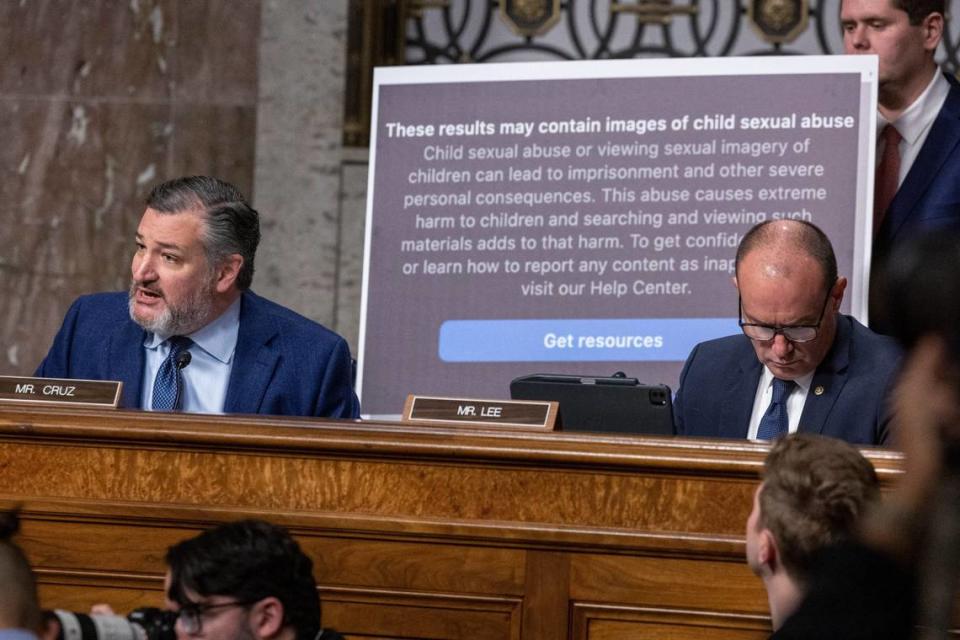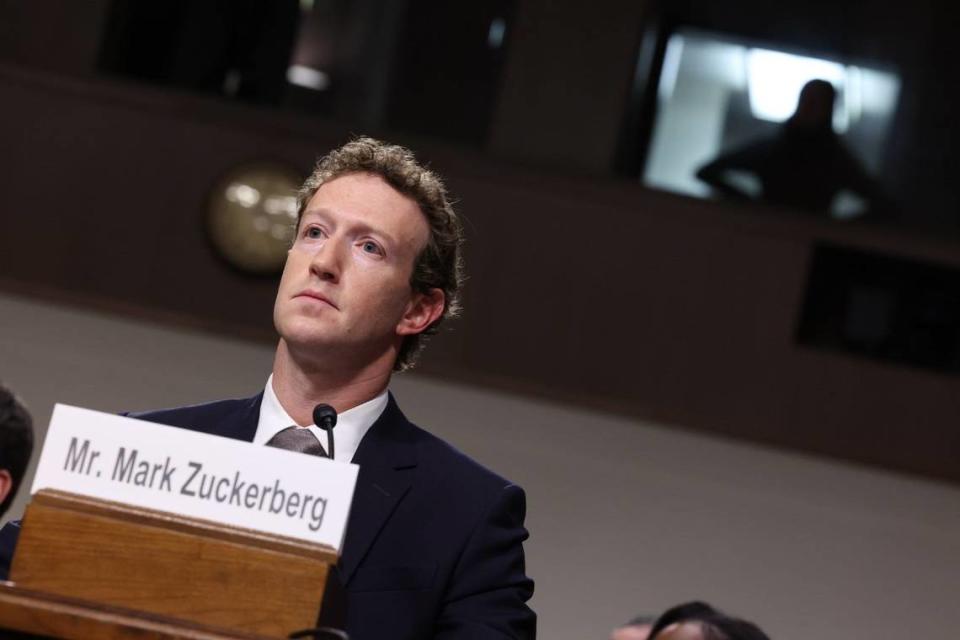Cruz’s rage at Zuckerberg for online predators is right, but he’s not alone to blame | Opinion
- Oops!Something went wrong.Please try again later.
- Oops!Something went wrong.Please try again later.
Social media platforms have drawn teens in like no other demographic. While apps such as Instagram and TikTok were originally touted as ways to facilitate connection, they have also turned into yet another avenue where sexual predators can thrive.
This was one of the main topics of discussion Wednesday as the Senate Judiciary Committee interrogated the chief executives of several tech companies, including Meta CEO Mark Zuckerberg, about harmful sexual content, online predators and the inability of his platforms, primarily Facebook and Instagram, to completely shield teens from being targeted.

Sen. Ted Cruz, ever a litigator but also the father of two teens, lambasted Zuckerberg for not doing enough to protect children from explicit content and online predators. With a visual aid at hand, Cruz showed an actual warning screen that appears when someone is searching for explicit material that shows abuse of minors. Instead of blocking the content, Instagram gives predators a choice: “get resources” or “see results anyway.”
Zuckerberg tried to explain the reasoning, or what he called “the science” behind such an offer and to tell Cruz how algorithms often work, to no avail.
“Mr. Zuckerberg, what the hell were you thinking?” Cruz shouted.
Zuckerberg did offer that Meta’s task force has done more to halt explicit content and hand over child predators than its tech rivals. If that’s even partly true, it means there’s so much garbage online — and so many predators targeting kids — that even a company with tech geniuses and a massive budget at its disposal can’t completely stop it.
At the prompting of another line of questions, Zuckerberg turned and apologized to families attending the hearing whose children had suffered from being targeted or abused.
“I’m sorry for everything you have all been through,” Zuckerberg said. “No one should go through the things that your families have suffered, and this is why we invest so much and we are going to continue doing industry leading efforts to make sure no one has to go through the things your families have had to suffer.”
According to Pew Research, the majority of children ages 13 to 17 say they use TikTok (63%), Snapchat (60%) and Instagram (59%). A horrifying November Wall Street Journal report found that through code words and emojis, Instagram’s algorithm actually spreads child pornography and aids sexual predators in finding minors to target. Due to the nature of algorithms, just as one might look for recipes or vacation spots on Instagram and continue to see more similar material, predators find more children to target or child-abuse content to view.
Although Meta does have an established task force dedicated to addressing child-safety problems on its platforms, they’re still unable to screen or moderate all of it, such is the size and scope. In December, New Mexico Attorney General Raul Torrez filed a lawsuit against Meta for opening children up to these crimes. It reveals that even in 2021, Meta was aware that around 100,000 children had been targets of harassment or predatory behavior daily.
Social media for teens has become a Pandora’s box with many players: There’s the teen users, their parents, the platforms, and of course, the predators themselves. Each plays a significant role.
According to Instagram’s community guidelines, nude images or videos are not allowed. Neither are images or videos of graphic violence, sexual activity, or even content that promotes smoking. But obviously, not everything harmful is getting removed or filtered appropriately. Meta must do its part and increase efforts to remove harmful content. The option for users to continue reviewing explicit content should not exist and would seem to contradict their own policies.

Then there are the predators themselves. While Cruz is right to hold Zuckerberg accountable, it’s almost like blaming a bar when a woman is raped after her drink is spiked with drugs rather than arresting the rapist. When child predators are discovered active online, they must be held accountable to the fullest extent of the law. This would eradicate the problem entirely.
Parents must do what’s best for their families, whether that’s banning social media apps altogether, checking teens’ phones, or discussing with their teens the importance of what they post, whom they interact with and what they’re viewing online. Kids have to be 13 to use Instagram, and though the app doesn’t offer parental control features, content and activity can be controlled through settings.
The Florida Senate is working on a bill that would ban kids younger than 16 from using Instagram. State and local governments can and should do their part, but a lot of power lies in the hands of parents and teens themselves. Online predators have a harder time targeting kids who aren’t on their phones all the time.
Do you have an opinion on this topic? Tell us!
We love to hear from Texans with opinions on the news — and to publish those views in the Opinion section.
• Letters should be no more than 150 words.
• Writers should submit letters only once every 30 days.
• Include your name, address (including city of residence), phone number and email address, so we can contact you if we have questions.
You can submit a letter to the editor two ways:
• Email letters@star-telegram.com (preferred).
• Fill out this online form.
Please note: Letters will be edited for style and clarity. Publication is not guaranteed. The best letters are focused on one topic.

